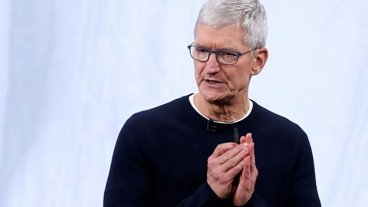Investors probe Apple's Jobs on successor, games, future products
AppleInsider joined Apple investors, some of whom traveled from as far away as Europe, at the company's annual shareholders meeting in Cupertino on Tuesday, where Steve Jobs and his executive team were both grilled and lauded for their future outlook and strategy in terms of games, retail operations, corporate accountability, future product plans, and Jobs' future successor as chief executive.
Jobs started by introducing Daniel Cooperman, Apple's new senior vice president, general counsel, and secretary, who conducted the official portion of the meeting. Jobs also introduced five other board members in attendance, including Bill Campbell, Al Gore, Google's Eric Schmidt, Genentech's Art Levinson, and retail expert Millard Drexler.
The newest member of the board, Avon CEO Andrea Jung, was busy traveling, but shareholders applauded Jobs' recruitment of a woman to serve on Apple's board. Executive diversity had been a subject that received attention from shareholders at previous meetings.
Shareholders were asked to vote to approve the reappointment of board members, which they did, as well as consider two issues raised by shareholders.
The first was a proposal initiated by the AFL-CIO Reserve Fund, which sought to initiate an annual referendum to issue a nonbinding opinion on executive compensation. The same measure only achieved 41% approval last year, but passed this year. Apple's board had recommended voting against the proposal both years, calling it a "blunt and insufficient instrument for registering dissatisfaction."
Jobs later quipped, "I'm hoping that the 'say on pay' proposal will help me with my $1 a year," an allusion to his famously low salary. Jobs has been compensated primarily though stock options, which have exploded in value over the last eight years as Apple's market valuation has rocketed upward.
The second proposal sought to set up a new corporate accountability group to monitor and respond to global issues, but investors did not approve of the measure. Following the official voting session, the meeting was adjourned and Jobs opened the floor up to comments.
Jobs on the Hot Seat
The first question presented by an attendee from San Francisco took on Apple's goals in the market for video games. "Gaming is bigger than Hollywood. With over $18 billion in cash, is Apple interested in, say, buying Valve to acquire Half Life in the manner that Microsoft bought up Mac game developer Bungie and turned what would have been a Mac game, Halo, into the main reason to by the Xbox and develop games using DirectX? What is Apple's strategy in games on the Mac, iPod, iPhone, and Apple TV? I ask this because games developers who appeared on stage at WWDC last year have made comments that suggest Apple isn't doing the things needed to support serious gaming. Are they wrong, or are you?"
Jobs responded by pointing out the Windows games released by EA for the Mac using Transgaming's Cider following last years WWDC, and noted support Apple has given to other Mac game developers, notably Apple Design Award winner World of Warcraft from Blizzard, but deflected interest in going head to head with Microsoft in the PC gaming business. He also noted the impending SDK release for the iPhone and iPod Touch would open the market for new opportunities for gaming.
After noting that he had other questions to ask but would get in line again to ask them, Jobs told him to go do that. At his next opportunity the attendee read from his notes saying, "Last year I asked about Apple's plans for .Mac, and we got better integration in Leopard and the new Web Galleries for publishing video and photos from iLife and the iPhone. Does Apple recognize the simpler potential of adding a blogging client to make text publishing just as easy? I would love to use .Mac more; the barriers have been slow uploads and limited bandwidth. Any plans to make .Mac more competitive and attractive?"
Jobs noted that there will be more .Mac applications released later in the year, and again noted that the iPhone SDK would enable third parties to address the subject of iPhone blogging "if Apple does not address it." Jobs then recommended that he learn Cocoa and write an iPhone blogger app himself.
When asked about video rental media availability in iTunes in terms of both quality and quantity, Jobs admitted that the studios have fallen behind in delivering content, mirroring the same kinds of issues labels had in setting up music within the first year of the iTunes Store. Jobs said the goal of 1000 rental titles was still short at around 600, and that quality varied from "spectacular to than less that what we'd like to see," but noted that the studios are working on difficult issues with gaining clearance for content created before anyone had contemplated Internet distribution. Existing films need to have rights lined up from talent and copyright owners who had never outlined their rights and royalties in terms of downloads, and work in those areas is accelerating.
An investor noted that the media often equates Jobs with Apple, and asked what would happen to Apple without Jobs. He responded by noting that the board already has several well qualified options to draw upon were he to be "hit by a bus," and expressed confidence in his executive team. "We've got great talent, and I think the board would have a few really good choices," Jobs said. Tim Cook has been cited by outside sources including the Wall Street Journal as a likely successor to Jobs.
iPhones in Asia and Macs in Business
Cook, who heads up Apple's operations, fielded several questions about Apple's plans internationally, including availability of the iPhone in India, China, and other parts of Asia. He specifically noted that Apple will enter Asia in 2008, but declined to provide any specific details about where, or whether the company had any specific plans related to the markets in China and India. "We will one day enter China, we're not saying when, and we will one day enter India," he said.
Jobs chimed in to note that "we already do business in those countries," and again expressed confidence in Apple's goal to sell 10 million iPhones in 2008. Cook also responded to worries about unlocked iPhones, noting that the company does make hardware profits on the iPhone, and that unlocked iPhones are really not the problem frequently represented in the media, but actually serve as an indication of high demand for the product.
Jobs also took the opportunity to get Cook to repeat the news that Apple passed Dell to become the top seller in the US education laptop market in 2007. When asked about the business market, Jobs pointed out that the consumer market is bigger than the business market, and that Apple is focusing on getting its products in front of consumers because individuals are more receptive to new things. Business users work behind "gatekeeper" CIOs, who restrict what gets purchased. In the consumer market, "everyone gets to choose," and many are bringing their Macs into business environments in a way that is accelerating business adoption of Macs.
Retail Stores
Returning for a third question, the original speaker asked, "Corporate responsibility and company valuation go beyond short term profits. Apple has addressed these issues in the past by leading in environmental factors, which has resulted in Macs commanding higher sale prices and profits compared to the average industry instant ewaste PCs, as well as in working quickly to address labor questions in China related to iPod manufacturing. What else is Apple doing to invest in the future and lead as a corporate citizen? Specifically, as a dynamically expanding retailer, is Apple comitted to paying retail employees here in the US living wages and hours that will support a high quality retail environment of highly motivated retail staff?"
Jobs seemed excited to address the questions, first delegating the subject of vendor responsibility to Cook, who noted that Apple delivered a code of conduct to all of its first tier vendors that it enforces vigorously. Cook stated that some vendors weren't taking it seriously, prompting Apple to cut off its relationships with them. He also noted that Apple has been expanding its standards to other tiers of vendors in addition to the companies it works with directly.
Jobs also introduced Ron Johnson, Apple's retail store maven, to comment on retail store employees. Johnson noted that Apple now has 15,000 retail employees who make up roughly half of the company. Unlike typical retail operations that have to deal with 80% annual turnover in employees, Johnson noted that Apple enjoys the opposite: 80% retention year over year. He noted that employees don't just have retail jobs, but have career paths as Creatives and Geniuses.
One former retail employee later commented to Jobs that moving from retail into engineering within Apple seemed too hard, forcing him to leave the company to find mobility elsewhere, and was later hired by Google. Along with several other people who stepped up to the mic, he also asked Jobs about the company's retail store plans, following similar comments from a woman from Wyoming who said she came specifically to attend the meeting. Would Apple consider building stores in rural states such as Wyoming, Idaho, Montana, North and South Dakota?
Johnson noted that Apple is moving into new markets further away from the larger population centers, and the company's ability to sell products and deliver a great retail experience are enabling growth potential. Johnson also noted that Apple is looking at retail locations in Idaho, Wyoming, and other more sparsely populated states to identify suitable locations.
Another investor from San Francisco asked the perennial question of whether Apple would be giving away its cash to investors in the form of a stock buyback or dividend. Jobs repeated that the company has no plans to do this, an answer he gives every year. Instead, Apple has voiced optimism that it can deliver greater growth and take advantage of strategic opportunities by holding its cash and using it to forge deals and possibly acquire other promising products or development teams.
I Can't Comment on Unannounced Products
A common answer to several questions was the favorite about not being able to reveal future plans. However, Jobs hesitated slightly when asked about the future of home server appliances. "Leopard Server pioneers wiki, blogging, calendar services that are really exceptional. Are there any plans to deliver an Xserve mini to bring theses kinds of services to consumers at an affordable price, like an embedded home server on the level of Apple TV and Time Capsule?'
Jobs seemed like he wanted to say something, but then punctuated the awkward silence with the typical refrain of not being able to say anything. Later, Jobs noted the phrase common within Apple referencing the idea that it's often executives who spill the beans: "Isn't it interesting, a ship that leaks from the top."
The comment was made in reference to a question of whether Apple TV would ever support free content supported by advertising. A student asked Jobs if it sounded like a good idea and if Apple had given the idea any thought. Jobs replied "yes," before backing up to note that he was not making any comments or announcements regarding future products.
Other questions fielded by Jobs included one from a young teenager wondering if the MacBook Air would ever get an optical drive or if Apple was expecting users to only buy movies from iTunes. Jobs answered by explaining that there are other MacBook models for users who want an optical drive, and that the Air was designed specifically for users who want high mobility. The young man seemed more satisfied with this answer than the rest of the media in general.
Another attendee asked why the iPod Touch ships with more storage capacity than the iPhone. Jobs explained that the iPhone has too much other internal antennas and chips to include the same amount of RAM as the simpler Touch, and suggested that future models of the Touch would likely maintain a certain amount of lead of storage capacity over the iPhone.
 Prince McLean
Prince McLean










 Mike Wuerthele
Mike Wuerthele
 Malcolm Owen
Malcolm Owen
 Chip Loder
Chip Loder

 William Gallagher
William Gallagher
 Christine McKee
Christine McKee
 Michael Stroup
Michael Stroup
 William Gallagher and Mike Wuerthele
William Gallagher and Mike Wuerthele







